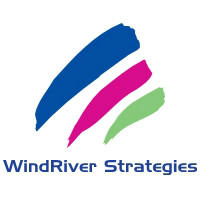
Great connections can make or break a career, an idea or a company. They can propel innovators from a dorm room to a packed conference room, accelerate professional advancement, and uncover untold opportunities. Conversely, the absence of connections can relegate even the most talented individuals to obscurity. In today’s increasingly “connected” world, becoming a connector is a required skill.
Malcolm Gladwell describes connectors as “a handful of people with a truly extraordinary knack [... for] making friends and acquaintances.”
ABOUT WindRiver Strategies
I’ve observed that being a connector isn’t the purview of genetics—through applying a few simple principles and consistent practice, everyone can learn to become a connector. There are three habits I have developed over the years—habits that have helped me become a master connector and that will help you hone your connecting sensibility, too.
HABIT 1: Ask Great Questions
Every relationship begins with discovery—learning about another’s experience, what you have in common, what sets you apart. It is critical, therefore, that you take the posture of “journalist” when building a new connection. At the heart of this, is asking great questions.
Great questions draw useful feedback from customers, wisdom from mentors, opportunities for collaboration from partners, and ideas for innovation from peers. While curiosity is a hallmark of a great connector it is not enough to be curious. Learning what, how, when, and of whom to ask questions is a key to connecting. Here are a few simple practices to employ when asking questions:
- Use open-ended questions: When I meet someone for the first time, a typical question I get sounds something like this: “Margaret, why did you come to America—was it because of the Irish economy, or did you have family here or did you want to go to school here?” The question is generous and well intentioned, however, it constrains the answer—guiding me toward an A, B or C response. This common approach to questioning—leading the witness—squanders an opportunity to glean deep insights. Pay attention to how you ask questions, and resist the urge to keep talking until your contact interjects. Silence is your friend—leading questions are not.
- Stay present: There is nothing more counter to connecting with someone, than asking a question and not listening to the answer. Conversely, we feel valued when encountering someone we’ve met before who then recalls a meaningful detail about us. Banish the inclination to think of what you’ll say next. Instead, maintain eye contact, and focus on the moment you’re in instead of teeing up the next point of conversation.
- Be clear on intent: When I meet a new person, I typically conclude with the same question: “How would I recognize a valuable opportunity or contact for you?” Surprisingly, few people have a clear, memorable answer. This simple question helps you determine how you can be a valuable connector for others—it is also a vital one to know how to answer for yourself.
Business Coaching
WRS delivers a full solution to companies looking to apply effective coaching strategies and Emergenetics insight to their day-to-day operations. Added available disciplines and tools include leadership training, teamwork and communication seminars, performance appraisal and development processes, strategic planning, sales, trust building exercises, feedback tools, employee orientation presentations, and one-on-one coaching. And because no one knows a company’s needs like the company itself, all of these are completely customizable to meet each organization’s unique challenges and opportunities. Clients include:
Infirmary Healthcare Oschner Health System ERA Sunrise Realty
Microsoft MillerCoors Garcia & Associates
Accenture Bank Of America Ashley Furniture Industries
Blue Cross Blue Shield DePaul University HJB Benefits
Hilton Hotels IGT Healthcare Financial Management Association/GA
United States air force
 RSS Feed
RSS Feed